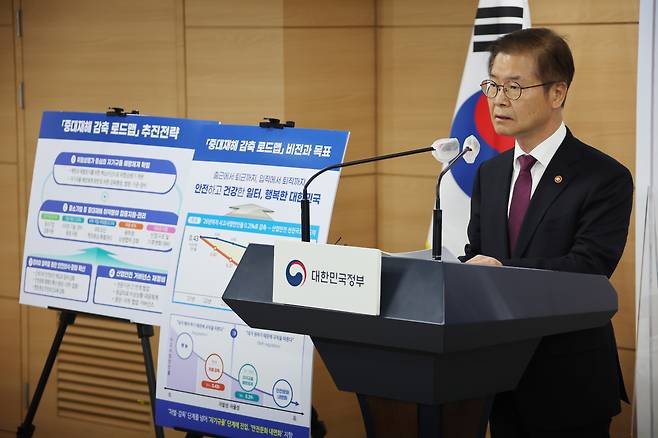In concession to firms, Korea to ease workplace safety law
전체 맥락을 이해하기 위해서는 본문 보기를 권장합니다.
"The growing controversies over the revision of the Serious Accidents Punishment Act got me into thinking whether (the act) is an effective means to reduce workplace disasters."
Earlier in October, Lee said in a parliamentary audit that "the subject of the safety law is broad and the government is suffering from a lack of workforce for inspection."
이 글자크기로 변경됩니다.
(예시) 가장 빠른 뉴스가 있고 다양한 정보, 쌍방향 소통이 숨쉬는 다음뉴스를 만나보세요. 다음뉴스는 국내외 주요이슈와 실시간 속보, 문화생활 및 다양한 분야의 뉴스를 입체적으로 전달하고 있습니다.

The government will seek to revise the act on serious industrial accidents that holds business management criminally liable for deadly workplace accidents by shifting its focus from punishment to prevention.
The move comes amid persistent opposition to the law from the business circles. They say the law, officially called the Serious Accidents Punishment Act, is vague in its application and opens up the possibility of abuse of power by investigative authorities.
The Ministry of Labor said it would seek to make the revision before the safety law is applied to companies with more than four employees by 2024. It pointed out that there had been no improvement in the number of workplace deaths since the implementation of the act in January.
"Workplaces subject to the Serious Accidents Punishment Act paradoxically saw an increased number of accidents," Labor Minister Lee Jung-sik told reporters at a briefing held at the government complex in Seoul Wednesday.
"The growing controversies over the revision of the Serious Accidents Punishment Act got me into thinking whether (the act) is an effective means to reduce workplace disasters."
Earlier in October, Lee said in a parliamentary audit that "the subject of the safety law is broad and the government is suffering from a lack of workforce for inspection."
From January to September, there were 156 cases reported under the safety rule, but these led to just two indictments.
In light of this, the government mapped out a blueprint based on "self-regulation" of enterprises to devise their own preventive measures.
With the plan, Seoul aims to reduce the nation's workplace deaths to the average of the Organization for Economic Cooperation and Development by 2026.
There were 828 workplace deaths in 2021, data from the Labor Ministry showed, indicating 43 out of every 10,000 workers died. This put Korea in 34th place out of 38 member nations of the OECD. The OECD average was 29 deaths per 10,000 employees.
The number of workplace deaths in Korea remained stagnant at between 40 and 50 per 10,000 workers over the past eight years -- the level at which the United Kingdom stood in 1970s and Japan and Germany in 1990s -- the government data also showed.
Lobby groups, such as the Federation of Korean Industries, the Korea Enterprises Federation and the Korea Federation of SMEs, welcomed the announcement.
But at the same time, the advocacy groups expressed regret that the new regulation could overlap with existing regulations, adding pressure to small- and medium-sized enterprises.
The gist of the new "self-regulation" road map is to force companies' labor unions and the management to jointly carry out risk assessments at workplaces, it added.
According to the Labor Ministry, companies with 300 employees or more will be obliged to do the bottom-up process beginning next year, while same regulations will be applied to smaller companies gradually starting from 2024.
The risk assessment will look at companies' level of dedication to preventing disasters and will be a deciding factor for the degree of punishment for the top decision maker when an occupational accident case is taken to the court, according to the government.
As the law stands, business chiefs are subject to at least a one-year prison term or a criminal fine of up to 1 billion won ($760,000).
Lee told reporters that the revision of the Serious Accidents Punishment Act is required to proceed with its road map, adding a special team would be established to discuss the matter in the first half of 2023.
This is in line with President Yoon Suk-yeol's intention to alleviate regulatory burdens.
Yoon has called the rule “excessive" and that it stifles corporate activities. The rule was passed during the previous Moon Jae-in administration.
(consnow@heraldcorp.com)
By Son Ji-hyoung(consnow@heraldcorp.com)
Copyright © 코리아헤럴드. 무단전재 및 재배포 금지.